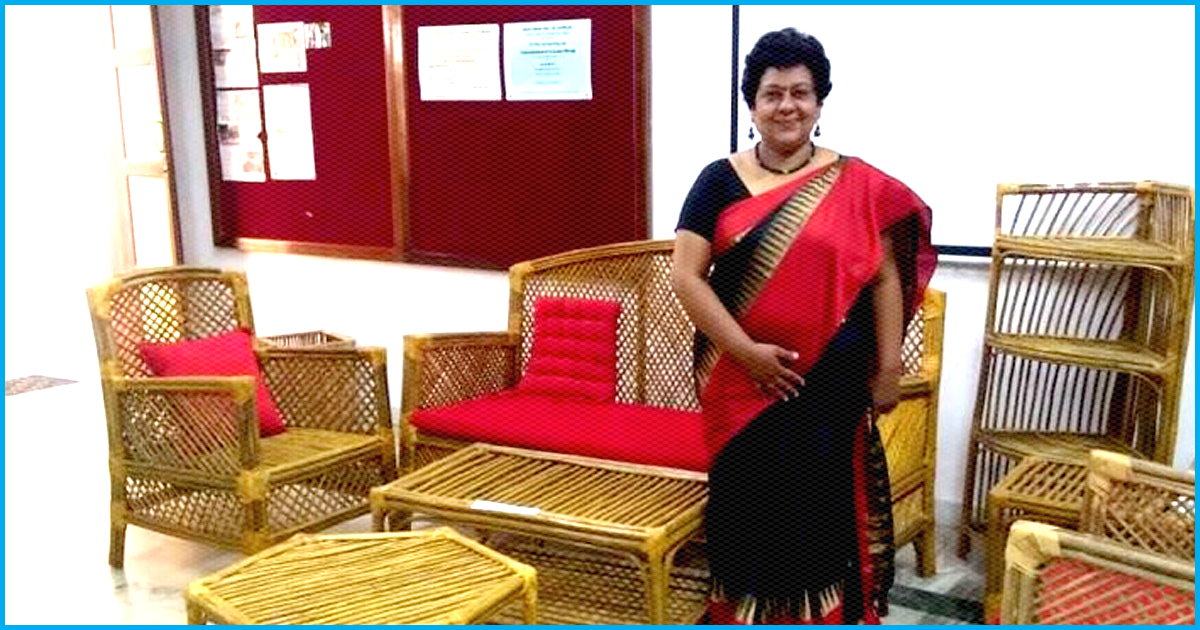You might have spotted Lantana camara plants with brightly-coloured flowers in nooks and corners of urban cityscapes. However, inside the pristine forests of Coimbatore, Tamil Nadu, these very plants were a threat.

When Dr Maya Mahajan was pursuing her PhD research in the forested lands of Nilgiri Biosphere Reserve, she discovered how different species of invasive forest weeds are completely destroying the natural vegetation. The rich botanical biodiversity of the region was particularly threatened by the uncontrolled growth of Lantana camara. The loss of valuable plants, in turn, was affecting the livelihood of local tribals which is dependent on forest products. Biological or chemical control of the weed was not environmentally sustainable. Hence, the forest department resorted to mechanical removal of the plants by using trained elephants – which was again a slow and elaborately expensive affair.
Dr Maya Mahajan was aware of the increasing demand for eco-friendly furniture. After detailed experimentation, she engaged the tribal people to turn these Lantana weeds into beautiful, and highly durable furniture. Since 2015, due to the efforts of Dr Mahajan and her research assistants Aravind R and Ramkumar, Lantana furniture has gained popularity in the urban market, which is, in turn, is generating good revenue for the aboriginal communities of forested areas in Tamil Nadu.

Local communities were sceptical about Lantana furniture
Born to social worker parents in Maharashtra, Maya had grown up watching her family actively helping the underprivileged people with food, clothing and funds for building houses. Due to her exposure to the masses, she always nurtured the desire to help them live better. “Through my research project on the forest product harvesting, I have had close interaction with the tribal inhabitants of Siruvani, Mudumalai, Wayanad and Silent Valley. I shared a good rapport with the communities. Yet when I approached them with the proposal of making furniture from Lantana, they were reluctant, doubting its feasibility,” Maya shares with The Logical Indian. Most of them were complaining about other non-profit organisations who trained them in various skills in the past with the promise of employment but left with no fruitful results. It took Maya a lot of time and effort to convince the tribal villagers.

“We are basically creating wealth out of waste”
The unexpected success of the first batch of furniture was enough to attract more people, mostly tribal women, who eagerly volunteered. Professional furniture-makers were engaged to train them. Through meticulous research, the team had devised an intricate process of turning the undesired forest weed into furniture. Firstly, the villagers collect matured Lantana plants from the forest. The branches and stems are boiled and the barks peeled. This helps to smoothen the texture and increase the flexibility.

Next, these are shaped and put together into exquisite chairs, tables, sofa sets etc, which appear similar to cane or wood furniture, but have certain advantages over them.

First and foremost, Lantana furniture is completely eco-friendly with zero chemicals being used in its manufacture. Being an invasive forest weed, Lantana has certain chemical compounds that render it resistant to all kinds of pests. Hence, Lantana furniture is more durable than bamboo or wood, which are prone to termite attack, especially in tropical climate. Moreover, since the raw material is free, the furniture is highly cost-effective for the consumer.

The villagers are also trained to make ornaments and toys from the Lantana twigs. Indirectly, this entire project is saving a biodiversity-rich zone from losing its biological wealth, while helping to sustain the aboriginal communities at the same time.

Tribal women are the prime beneficiaries
“95% of our workers are tribal women who previously had no source of regular income. This project is very convenient for them as they can continue the work in their own homes while attending to their children and taking care of household chores,” Maya explains.

Till now, the project has predominantly been funded by the Ministry of Environment. Word of mouth and social media has played the biggest role in the marketing process. But, the team, headed by Maya, plans to launch it soon as a full-scale business and popularise the unique products through e-commerce sites.
The furniture project has been adopted by some of the villages like Singhampathy, Kalkotipathy and Sarkarporathy, where the first batch of upskilled workers now train upcoming batches. In fact, the training has also facilitated a few youngsters to find better jobs. Recently, the Lantana furniture making has been recognised as a certified skill-training course and the proud founder wishes to replicate this project in different parts of the country.

Maya Mahajan has been awarded the International Women Achiever Award at the 2018 International Women’s Meet held in Chennai. A video created by Maya and her students at Amrita University, Coimbatore, explains the details about Lantana furniture making.
The organic farming initiative
However, the villagers in Sadivayal and adjoining hamlets did not take much interest in this project as they were traditionally agriculturists with fertile lands. However, frequent elephant raids in the fields and water scarcity were posing serious threats to their livelihood. Maya, an established botanist, introduced organic farming in these villages. She has trained them to cultivate mushroom, turmeric, rice, chilly, pulses and vegetables, which are not prone to be attacked by wild elephant groups. The villagers were overjoyed to find their production to be doubled using completely chemical-free methods. Maya has collaborated with some NGOs to train the villagers in making bio fertilisers and biopesticides. Presently, the crops are marketed locally, but the spirited professor is trying her best to connect these farmers with the urban market.
If you wish to know more about Lantana furniture, you can reach out to Maya Mahajan via mail: [email protected] or call her at 9489518865.
With #MySocialResponsibility, we aim to bring you more inspiring stories of individuals and organisations across the globe. If you also know about any changemakers, share their story at [email protected] and we’ll spread the word.












